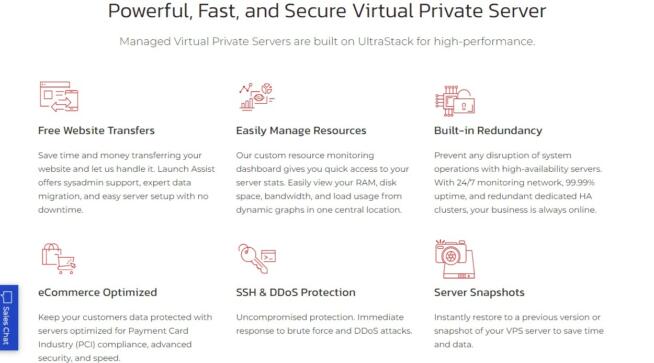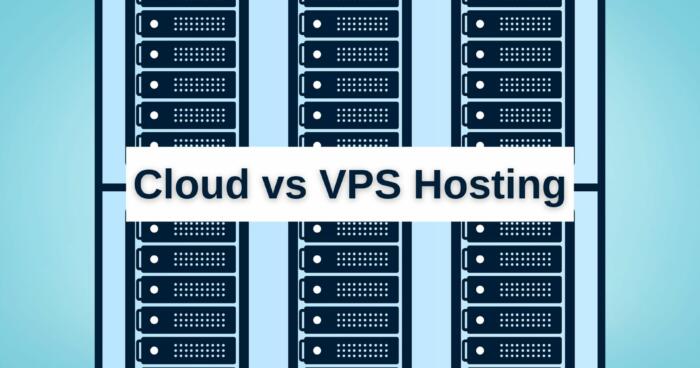Wanneer u een nieuwe website wilt beginnen, is het kiezen van een hostingprovider een van de belangrijkste dingen. Vervolgens wil je nadenken over het type hosting dat je zoekt, want dat gaat belangrijke parameters bepalen, zoals snelheid, veiligheid, schaalbaarheid, en natuurlijk – de prijs.
Hoewel shared hosting de eerste keuze is van veel mensen, kiezen gebruikers vaker wel dan niet voor cloud- of VPS-hosting. Zeker, dit zijn duurdere opties, maar veel gebruikers vinden ze geschikter voor hun behoeften. Maar wat als je niet zeker weet voor welke je moet gaan?
In dit artikel geven we je een volledig overzicht van cloud hosting vs VPS hosting om te zien welke keuze beter is voor jou. Met alles gezegd, laten we het hebben over wat deze oplossingen vertegenwoordigen en ze vergelijken in verschillende belangrijke categorieën om te zien welke zal winnen.
1. Wat is cloudhosting?
Laten we beginnen met cloudhosting. Zoals de naam al zegt, kunt u met cloudhosting een website hosten met behulp van een virtuele machine voor resources. Deze virtuele machine of machines zijn gebaseerd op fysiek gelokaliseerde servers die de vereiste middelen voor uw site eruit pompen.
Het belangrijkste voordeel van cloud hosting is dat de middelen op elk moment beschikbaar zijn, omdat deze virtuele machines met elkaar verbonden zijn.
Als een machine bijvoorbeeld zonder middelen komt te zitten, springt een andere machine die op een andere server wordt gehost in, levert de vereiste middelen voor de hosting van de site en zorgt er zo voor dat de site op elk moment goed werkt.
Cloud hosting is daarom zeer betrouwbaar en de middelen zijn verspreid over een groot aantal fysieke servers. Zo beschikt u over resources die altijd beschikbaar zijn omdat een andere fysieke server ze altijd kan leveren als een server om wat voor reden dan ook is uitgeschakeld of niet goed werkt.
2. Wat is VPS Hosting?

VPS staat voor Virtual Private Server. Daarom host VPS hosting uw website op één fysieke server verder opgedeeld in verschillende virtuele servers. In tegenstelling tot bijvoorbeeld dedicated hosting deelt u hier nog steeds de resources van de fysieke server met andere sites, wat veel mensen lijken te vergeten.
Een fysieke server is opgesplitst in verschillende virtuele servers, die elk fungeren als een aparte server, en wanneer u een VPS hosting plan koopt, krijgt u eigenlijk een van die virtuele servers en zijn middelen, vandaar de naam.
Het goede is dat u uw plan volledig kunt aanpassen en de hoeveelheid resources kunt krijgen die u wilt.
Bij shared hosting is dat onmogelijk. Bovendien wisselt VPS-hosting geen informatie uit met andere gebruikers van dezelfde VPS-server, dus de beveiliging is hoog. Vergeleken met cloud hosting is het echter minder betrouwbaar als de fysieke server crasht of uitvalt.
In dat geval crasht elke virtuele server op die fysieke server ook, waardoor de sites die erop gehost worden niet meer werken.
3. Cloud vs VPS Hosting Vergelijking
Nu u weet wat cloud- en VPS-hosting zijn, laten we eens kijken wat hun belangrijkste verschillen zijn.
3.1 Prijs (Teken)
Qua prijs zijn beide opties duurder dan shared hosting, maar ook veel goedkoper dan dedicated hosting. VPS hosting prijzen kunnen sterk variëren, afhankelijk van de middelen die je nodig hebt. Ze kunnen in de buurt komen van shared hosting en zelfs van de goedkopere plannen voor dedicated hosting.
Cloud hosting volgt dezelfde route. Het kan zowel goedkoop als duur zijn, maar de algemene regel is dat beide veel goedkoper zullen zijn dan dedicated hosting. In het algemeen kunnen we zeggen dat het in dit opzicht een gelijkspel is. Soms krijg je goedkopere VPS hosting, terwijl sommige providers goedkopere cloud hosting aanbieden.
Dit maakt het erg moeilijk om een winnaar aan te wijzen, dus laten we zeggen dat het gelijkspel is.
3.2 Prestaties en betrouwbaarheid (cloudhosting)
In termen van prestaties en betrouwbaarheid is cloud hosting een duidelijke winnaar. Ik bedoel, het is sneller en de middelen zijn verspreid over verschillende fysieke servers. Die werken om de best mogelijke prestaties te leveren en aan uw eisen te voldoen, zelfs als een van de servers uitvalt.
Een andere server zal snel “helpen” door de vereiste resources te leveren, waardoor u op elk moment topprestaties krijgt. VPS-hosting is ook snel, maar de prestaties zijn afhankelijk van de resources die u krijgt. Als u meer RAM, een sterkere CPU en SSD-opslag koopt, zal het zeer snel zijn.
Houd in gedachten dat uw Virtual Private Server een deel is van de fysieke server die wordt gedeeld met andere gebruikers. Als de server daardoor zijn grenzen bereikt, kan de hele ervaring slechter worden door de prestatiehit die elk van de gebruikers zal ervaren.
Hoewel dit, om eerlijk te zijn, zeer onwaarschijnlijk is en in veel ervaringen die ik had met VPS hosting, heb ik vrijwel altijd genoten van de uitstekende prestaties.
3.3 Flexibiliteit (Cloud Hosting)
Cloud hosting is ook flexibeler en maakt schaalbaarheid gemakkelijker. Bij VPS-hosting koopt u een vooraf gedefinieerde set resources op basis van uw behoeften. Als uw behoeften toenemen, kunt u slechts zoveel doen met de resources waarmee u werkt.
Schalen is daarom veel moeilijker, en uw site kan misschien niet goed omgaan met verkeerspieken. Cloud hosting is flexibeler en stelt u in staat om met een paar muisklikken meer resources te kopen. Zo kunt u snel overschakelen naar een duurder plan als uw eisen na verloop van tijd toenemen.
Met alle fysieke servers die voor u beschikbaar zijn, is het slechts een kwestie van prijs en uw wens om meer resources te krijgen. Als u meer betaalt, ontsluit de provider de resources van andere servers, waardoor uw prestaties toenemen en hogere belastingen, betere snelheden en meer verkeer mogelijk worden.
3.4 Veiligheid
Qua beveiliging worden zowel VPS als cloud hosting als zeer veilig beschouwd. Echter, cloud-based systemen, in het algemeen, zijn meer vatbaar voor cyberaanvallen, hoewel cloud hosting providers veel beveiligingsmaatregelen toepassen om dit te voorkomen.
VPS-hosting heeft deze maatregelen ook, aangezien elke server geavanceerde DDoS-bescherming, verschillende back-upopties, enzovoort biedt. Bovendien is elke Virtual Private Server onafhankelijk van de andere virtuele servers op een fysieke server, zodat ze elkaar niet kunnen beïnvloeden.
Moderne cloud en VPS hosting oplossingen zijn beide ongelooflijk veilig en u zult waarschijnlijk nooit horen dat ze gecompromitteerd worden door de “zware” beveiliging die ze hebben.
3.5 Aanpassingsmogelijkheden (VPS Hosting)
Hoewel beide opties aanpasbaar zijn, denk ik dat VPS-hosting hier een beetje beter is, omdat het gemakkelijker aanpasbaar is. Ten eerste kunt u kiezen welke resources u krijgt, en elke VPS hosting oplossing geeft u root toegang met handige toevoegingen zoals cPanel of Softaculous installer.
Bovendien kunt u bij veel VPS-hostingdiensten kiezen uit Linux en Windows als besturingssysteem en kunt u veel andere aspecten van uw plan aanpassen. Zeker, je bent beperkt door de middelen die je hebt, maar zelfs in dit kader krijg je genoeg opties.
Cloud hosting heeft ook aanpassingsmogelijkheden. De belangrijkste is de mogelijkheid om precies die hoeveelheid resources te kopen die u nodig hebt, zodat u niet te veel betaalt voor iets dat u niet gebruikt. Als u echter uw interface of iets anders wilt aanpassen, moet u meer technisch onderlegd zijn.
Cloud hosting, in dit opzicht, is een beetje complexer dan VPS hosting waar maatwerk eenvoudiger is. En om die reden denken we dat VPS-hosting een beetje meer geschikt is voor degenen die op zoek zijn naar uitgebreide aanpassing en personalisatie.
4. Samenvatting: Wie wint?
Als we onze vergelijking als referentie nemen en deze resultaten gebruiken, kunnen we zeggen dat cloud hosting wint. Het is sneller, biedt meer flexibiliteit en kan net zo goedkoop zijn als VPS-hosting. Het is echter niet allemaal zwart-wit en de keuze van het type hosting hangt volledig af van uw behoeften.
VPS hosting is voor degenen met een consistent aantal website bezoekers zonder speciale behoeften voor het schalen en het verhogen van hun middelen. Deze hosting is geweldig voor maatwerk en stelt u in staat om snel, gemakkelijk en moeiteloos uw website op te zetten met een OS, plug-ins, en Control Panel van uw keuze.
Cloud-omgeving kunt u meer middelen en het is schaalbaar, wat betekent dat je kunt de website aan te passen aan uw groeiende behoeften. Het is sneller, beter presterend en betrouwbaarder dankzij de afhankelijkheid van meerdere servers om resources voor uw website te leveren.
We earn commissions using affiliate links.






![Beste cloud gaming-diensten ([year]) [PC, PS4 & Xbox One] 8 Best Cloud Gaming Services 2021 [PC, PS4 & Xbox One]](https://www.privateproxyguide.com/wp-content/uploads/2020/03/Best-Cloud-Gaming-Services.jpg)
![10 Beste WordPress hosting Nederland ([year]) die goedkoop zijn best web hosting for wordpress](https://www.privateproxyguide.com/wp-content/uploads/2021/03/best-web-hosting-for-wordpress-150x150.jpg)





